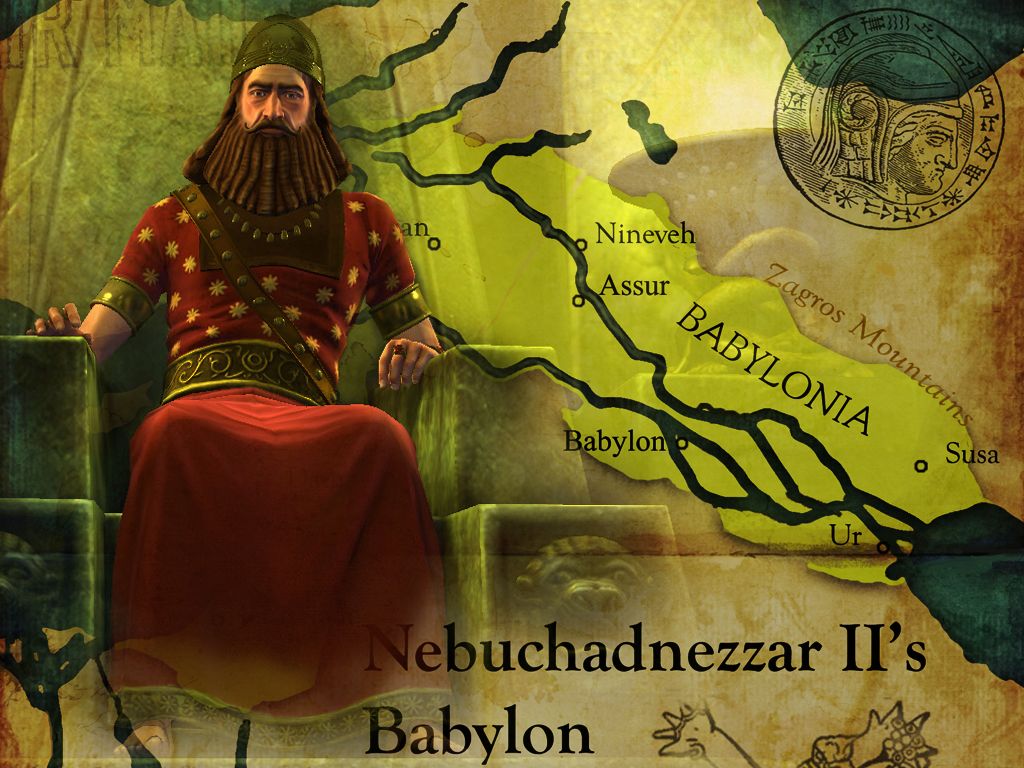Nabopolassar father of Nebuchadnezzar


Nebuchadnezzar II Viewing the Hanging Garden

SAMMURAUT, QUEEN OF BABYLON


deportation of the Hebrews to Babylonia
Nabopolassar died at this moment. His son and successor Nebuchadnezzar II had been his father's Commander-in-Chief, and was a general of great experience and ability. He grasped the remains of the Assyrian Empire, and extended his authority to the Egyptian border, his two attacks upon Jerusalem (597 and 587 B.C.), and the deportation of the Jews to Babylonia, being very well known. These were, in fact, simply incidents in Nebuchadnezzar's struggle to impose his authority over an area which the new Egyptian dynasty was coming to regard as its own sphere of influence. The Medes at the same time extended their realm to include the old kingdom of Urartu and much of Asia Minor.
The Neo-Babylonian Empire, as the empire founded by Nebuchadnezzar is usually called, suffered economically from the fact that the Medes now controlled the trade routes from farther east passing through the old kingdom of Urartu and Asia Minor to the west. It was in an attempt to rectify this that the Neo-Babylonian rulers tried to extend their authority in the south-west, so that they would benefit by the trade routes coming up from Arabia. We have seen that Nebuchadnezzar took steps to control the whole of Syria and Palestine, and later in his reign there is evidence that he unsuccessfully attempted an invasion of Egypt itself. His second successor, Neriglissar, was probably actuated by similar economic motives when he undertook a campaign into Asia Minor (just before 556 B.C.). It was, however, the last Neo-Babylonian King, Nabu-na'id (Nabonidus) (555-539 B.C.), who made the most determined endeavours to put the Empire on a sounder economic footing. Much of his reign was spent in western Arabia, where he established a chain of military colonies along what is known as the 'incense route' from Teima to Yathrib (modern Medina).
By the time of Nabu-na'id relations between Babylonia and the Medes had gravely deteriorated, and Nabu-na)id in the early years of his reign had looked with favour upon a certain prince who was in revolt against the Median King. This prince was Cyrus the Persian. Cyrus, however, once he had gained control of the Median Empire, proceeded upon an expansionist policy which quickly brought him into conflict with Babylonia. By brilliant generalship he succeeded in gaining control, in 547 B.C., of the whole of Asia Minor as far as the Greek settlements on the west coast, and then seized the eastern part of Assyria, which of course fell within the Babylonian sphere of influence. War broke out, and Cyrus invaded the Babylonian Empire over a wide front. Public opinion through-out the civilised world at this time is reflected in Isaiah xlv I and 4, where the Hebrew prophet hails Cyrus as the chosen one of the Lord. Nabu-na)id was much less happily placed. Even within Babylonia he was unpopular, in part from the economic difficulties which faced the country and in part from attempts he had made at religious reform, and when Cyrus finally marched upon Babylon, he already had many adherents within the city. Babylon fell to I him in 539 B.C.
The Persian Empire, into which Egypt was incorporated in 525 B.C., now exceeded in extent any which had gone before it, and of this Empire Babylonia and Assyria formed only one province. Babylonian and Assyrian culture had, however, a continuing influence, and amongst other things Persian art (30), civil administration and military science owed much to their Babylonian or Assyrian roots. Babylon was, if not the political, certainly the -administrative and cultural capital of the whole Persian Empire.
After 500 B.C. the Persian Empire came into collision with Greece, and conflict continued intermittently until in 331 B.C. the Macedonian Alexander the Great overthrew the Persian power at a battle near Arbela, proceeding afterwards to extend his authority to the borders of India. Had Alexander lived, it was his intention to establish a world empire with its capital at Babylon, but his premature death at Babylon in 323 B.C., at the age of thirty-two, left his territories to be divided up amongst his generals. The eastern provinces, including Babylonia and Assyria, eventually fell to Seleucus 1 (301-281 B.C.). Under the Seleucids Babylonia and Assyria came increasingly under Hellenistic cultural influence, and Akkadian, which had already 'been superseded by Aramaic as the language of everyday speech, was no longer even written, except for religious or astronomical purposes. The old culture of Babylonia and Assyria was dead, and the future lay with Palestine, Greece, and Rome.
Walang komento:
Mag-post ng isang Komento